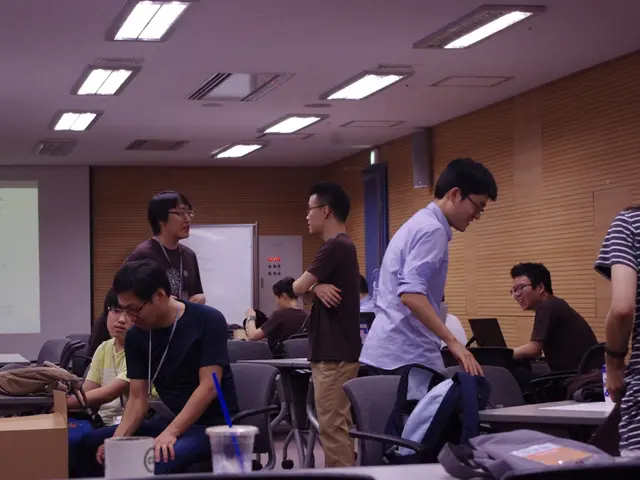Insight Report: Opinions of Employers in the Creative Sector Regarding Skills Development Programs: 2025 Version
News Article: Boosting Skills and Training in the UK's Creative Industries
The UK's creative industries are making strides in enhancing their workforce through a focus on apprenticeships, work placements, and technical training, as outlined in the Government's Creative Industries Sector Plan.
Apprenticeships and Work Placements
The creative industries are embracing collaborative initiatives to cultivate a skilled and diverse workforce. Programs like the Centre for Creative AI (CCAI) foster close partnerships between academia, business leaders, and students, offering challenge projects and pathways that blend research with hands-on industry experience.
Technical Training Initiatives
Similar to the construction-focused Technical Excellence Colleges, creative industries also benefit from skills bootcamps and funding schemes. For instance, the West of England Combined Authority supports upskilling in engineering-related technical skills, indirectly affecting creative tech industries, through business grants and training facilities.
Funding and Employer Engagement
Government-backed funds, such as Amazon’s Regional Creatives Fund, support non-profits promoting career pathways in creative sectors for underserved communities, fostering inclusion and addressing barriers to entry. The Creative Industries Sector Vision aims to boost business investment from £17 billion to £31 billion by 2035, a move expected to enhance employer engagement in training and workforce development.
In summary, the UK’s creative industries are benefiting from coordinated government sector plans, active employer engagement through collaborative hubs like the Centre for Creative AI, grant funding that supports skill-building non-profits, and regional programs providing practical training and apprenticeships to create career pathways in creative fields.
Government-Backed Surveys and Industry-Endorsed Training Networks
Government-backed surveys can help policy makers understand the level of employer engagement with skills initiatives, while the creation of industry-endorsed training networks can offer high-quality provision. The Government's devolution agenda offers opportunities for national and local governments to coordinate efforts and trial tailored skills interventions.
The Future of Skills in the Creative Industries
While creative industries employers are more likely to have had someone on a work placement compared to all industries, only a minority of creative industries employers had recruited education leavers in the past 2-3 years. Fewer creative industries employers provide accredited training linked to formal qualifications compared with UK employers overall. The creative industries recruit young people under 25 and older people over 50 at a lower rate compared to other sectors.
These findings underscore the need for continued efforts to improve awareness of skills interventions and qualifications among creative industries employers and to develop sector-specific initiatives at the local level. By building on effective practices across the four nations, there is an opportunity to better connect potential workers of diverse ages with creative firms, ensuring a strong pipeline of talent for priority sectors like the creative industries.
- The UK Government's Creative Industries Sector Plan aims to promote development by emphasizing apprenticeships, work placements, and technical training.
- Partnerships between academia, business leaders, and students, like the Centre for Creative AI, offer creative, hands-on industry experiences blended with research.
- Skills bootcamps and funding schemes, similar to those in the construction sector, are also beneficial for the growth of technical skills in the creative tech industries.
- Government-backed funds, such as Amazon’s Regional Creatives Fund, aid non-profit organizations that provide career pathways in creative sectors for underserved communities.
- Industry-endorsed training networks can offer high-quality provision, while government-backed surveys help policy makers understand employer engagement with skills initiatives.
- The future of skills in the creative industries requires continued efforts to improve awareness of qualifications and develop sector-specific initiatives at the local level.
- Connecting potential workers of diverse ages with creative firms is necessary to ensure a strong pipeline of talent for priority sectors like the creative industries.
- This effort to enhance the workforce in the UK's creative industries is part of the broader context of policy-and-legislation, education-and-self-development, politics, general-news, and economic development.




